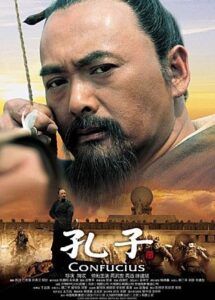In 655 BC, during the Spring and Autumn period of China, the state of Jin harbored ambitions to attack the state of Guo. The King of Jin instructed his minister, Daifu Shunshi, to prepare valuable gifts and then requested passage through the state of Wu, which was situated between Jin and Guo. King Wugong of Wu, tempted by the treasures offered by Duke Jin Xian of Jin, agreed to grant them passage. However, a minister of Wu, Gong Ziqi, advised King Wugong against it, saying, ‘Absolutely not. Our state and Guo are neighbors, like lips and teeth. Haven’t the old sayings mentioned that the boards of a cart rely on each other, and without lips, the teeth would feel cold? This saying refers to our relationship with Guo. If one falls, the other cannot stand alone. If Guo is conquered by Jin, Wu will also find it difficult to survive on its own.’
However, blinded by wealth, King Wugong allowed Duke Jin Xian passage. As well known, Jin conquered Guo and on their return, invaded Wu, capturing King Wugong. Eventually, King Wugong not only failed to secure the gifts but also lost his state.
This story, known for the idiom ‘lips gone, teeth cold’ (脣亡齒寒), which implies the absence of mutual support, is well documented in the ‘Zuo Zhuan’, a commentary on the ‘Spring and Autumn Annals’ compiled by Confucius. The idiom suggests that no one can achieve worthwhile things alone, and further, that one should not be fixated on immediate gains but understand the ultimate goals of competition. King Wugong of Wu was blinded by the immediate treasures, failing to see the future detriment to himself.

In 2007, Samsung Economic Research Institute (SERI) asked managers for ‘the habit that has been most powerful in bringing them to where they are today’ in the form of an idiom, and 19.7% of respondents mentioned ‘lips gone, teeth cold’ (脣亡齒寒), suggesting the value of connections and competitiveness. Essentially, no one succeeds alone; behind every successful person, there are always unseen, shadow-like figures who have been with them.
There’s a Korean adage that translates to, “When your cousin acquires land, you feel a twinge in your stomach.” This expression shines a light on the universal human tendency to feel envious or bitter when relatives or people close to us achieve success. The proverb extends beyond the specific scenario of cousins and property acquisitions to encapsulate the broader discomfort we feel at the accomplishments of those around us. While it may seem illogical, this sense of envy is a widely shared emotion. It could stem from a sense of rivalry or our own insecurities. Regardless of its origins, it’s an emotion many of us can understand and have felt at some point. Nonetheless, looking at it from a practical standpoint, the success of a family member, like a cousin, could potentially open up more opportunities for us and lessen our own burdens.
We all enter into competition to satisfy our desires. As mentioned, the essence of competition lies in the scarcity of resources. However, humans have found ways to create invisible resources. Success is not achieved alone, and no one can create value that the world desires by themselves. The law of inequality, known as the 80:20 rule, is also a result of having counterparts.
Richard Koch, who summarized this principle in his self-help book ‘The 80:20 Rule’, emphasizes that we should focus on the 20 and let go of the 80. For example, among 100 employees, more attention should be given to the 20 who perform well, and the remaining 80 should be either dismissed or redirected. However, he overlooks one thing: if only 20 are left, then again, 80 percent, which is 16 of them, will fall behind.
There are always winners and losers in competition, but it is easy to overlook that the initial victory of the 20 was possible due to the support of the 80. Of course, those in the lagging group should strive for better competitiveness. For a company, competition is important, but cooperation is equally important.
An organization that appropriately harmonizes competition and cooperation can become a competitive company. Yet, we do not know the happy balance of achieving this harmony. In reality, there is no absolute good or absolute evil. The answers we seek are always somewhere in between. It’s not easy to recognize this. Thus, life is not a science but an art.
We compete with some and cooperate with others. Today’s allies may become tomorrow’s competitors because the rules of the game called life change constantly. Today’s competition is not simply a game of defeating others, implying that competitiveness is not merely about being stronger. Winning in all areas is not the essence of the game. Therefore, we must ponder what truly constitutes winning competition.
We love stories. The most common stories we hear are about people who choose what they love despite difficult circumstances and succeed against all odds. These stories appear in books about success. The second most popular stories are about successful but unhappy people, typically found in movies or novels. However, stories of people who had talent and worked hard but failed are seldom heard.
Stories of successful people often follow a stereotypical pattern. We frequently hear stories of students who entered prestigious universities as top students without ever having private tutoring and were devoted to their studies. The success stories of entrepreneurs are similar. Most successful entrepreneurs are said to have diligently worked on one thing with conviction. They also subtly boast about their ability to foresee the future. These individuals are almost branded as losers due to their failures before dramatically turning from losers to winners. Such miraculous stories become common subjects in books and movies.
Most of these stories are likely exaggerated or embellished. Even if they are true, the fact that many more people live similarly but fail indicates that these stories do not constitute a formula for success. At best, they are only one factor of success.
There are always more people who fail than those who succeed. Moreover, if competition is inherently a tournament, setting higher standards of success inevitably increases the number of losers. Nowadays, success seems to be judged by a single criterion: money. Such ‘success stories’ not only create more losers but can also produce successful yet unhappy individuals. In a tournament judged solely by money, it is inevitable that there will be only a few winners, and many will compete in fields they do not enjoy.
In fact, trying to win in all competitions is not only reckless but also ignorant. It is impossible to be good at everything, and even if it were possible, it would unnecessarily create more enemies. Even in competition, there is no need to win every battle. There are too many examples where one may lose a battle but ultimately win the war. Rome was devastated by Hannibal in the Italian Peninsula, but Roman general Scipio directly attacked Hannibal’s base in Carthage, losing the battle but winning the war.

Many people seem to think that success depends on money and status, and they rush towards that goal. To these people, life seems to be governed solely by the laws of victory and defeat, despite the fact that we participate in countless tournaments and various types of competition. If money is the goal, most of us may end up as losers. When competition exists in this form, we may succumb to what neuropsychologist Paul Pearsall calls ‘Toxic Success Syndrome’.
‘Toxic Success Syndrome’ prevents us from escaping inferiority complexes, makes us suspicious of each other, and fosters hostility. It leads to disappointment that only highlights what we have not achieved and what we lack, potentially leading to depression. No one can succeed alone, nor can anyone truly enjoy and be satisfied with success alone. True victory is being content and grateful by oneself, and its value lies in sharing the joy of victory with those around us.

답글 남기기